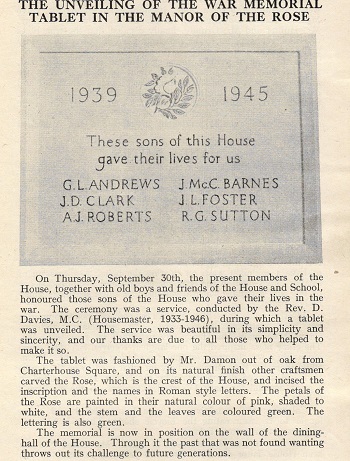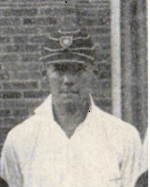The Manor War Memorial

When the Manor was converted to a Nursery for Merchant Taylors’ Prep, many artefacts integral to its history were stored away and all but forgotten. However, the Archive has sterling allies in the form of the Buildings Manager, John Harratt and his trusty colleague, Peter Graham-Leigh. They are engaged in a number of projects to restore key parts of the School’s heritage and the first to be concluded was the Manor’s War Memorial, which was unveiled on 30th September, 1948.
The Taylorian tells us that the service was attended by all the members of Manor House, old boys and friends of the Boarding House. The board was fashioned from oak taken from the Charterhouse Square site and it was worked on by several craftsmen including Mr Damon from the School.
The six Manorians who lost their lives were as follows:
Gordon Lionel Andrews: Head Monitor (1936) and scholar of St John’s College, Oxford. Swimming colours, musician, actor and member of the CCF. Killed in the North African Campaign on 26th November, 1941 as part of the Royal Tank Regiment.
 James Donald Clark (pictured): Captain of Rugby 1934, the first season at Sandy Lodge. Went to Oxford. Drowned on 24th July, 1941 as part of the 1st Bn., 12th Frontier Force Regiment.
James Donald Clark (pictured): Captain of Rugby 1934, the first season at Sandy Lodge. Went to Oxford. Drowned on 24th July, 1941 as part of the 1st Bn., 12th Frontier Force Regiment.
Andrew James Roberts: musician and member of the scouts. Sang in the choir and played clarinet in the Orchestra. Killed 24th May 1944 in Italy, as part of the Northamptonshire Regiment.
John McCulloch Barnes: Monitor, First XV Captain 1935 and First XI cricket. Appeared in drama and music productions. Major in the Parachute Regiment, died when dropped 40 miles from Athens during Operation Manna.
John Lawrence Foster: Fencing and OTC. Flying officer in 3 sqdn, RAFVR. Killed on 5th October, 1943 flying a Typhoon in a Rhubarb mission (two typhoons flying low level seeking opportunistic targets) over Belgium. Possibly shot down by a FW190. Aged just 20.
Richard George Sutton died of illness in 1942, as a Sub Lt in the RNVR whilst at Chatham. A prompter at MTS and Vice President of the Arts Club, he gained an Open Scholarship to read History at Keble College, Oxford before joining the staff at New Scotland Yard.
The Taylorian wrote that the Manor memorial, in recalling a past generation that was not found wanting, threw out a challenge to subsequent generations. Its restoration this year seems appropriate as the current boys face their own challenges in these difficult times. Originally in the Dining Room of the Manor, the board has now been placed in the School Chapel which also hosts Manor House Assemblies.